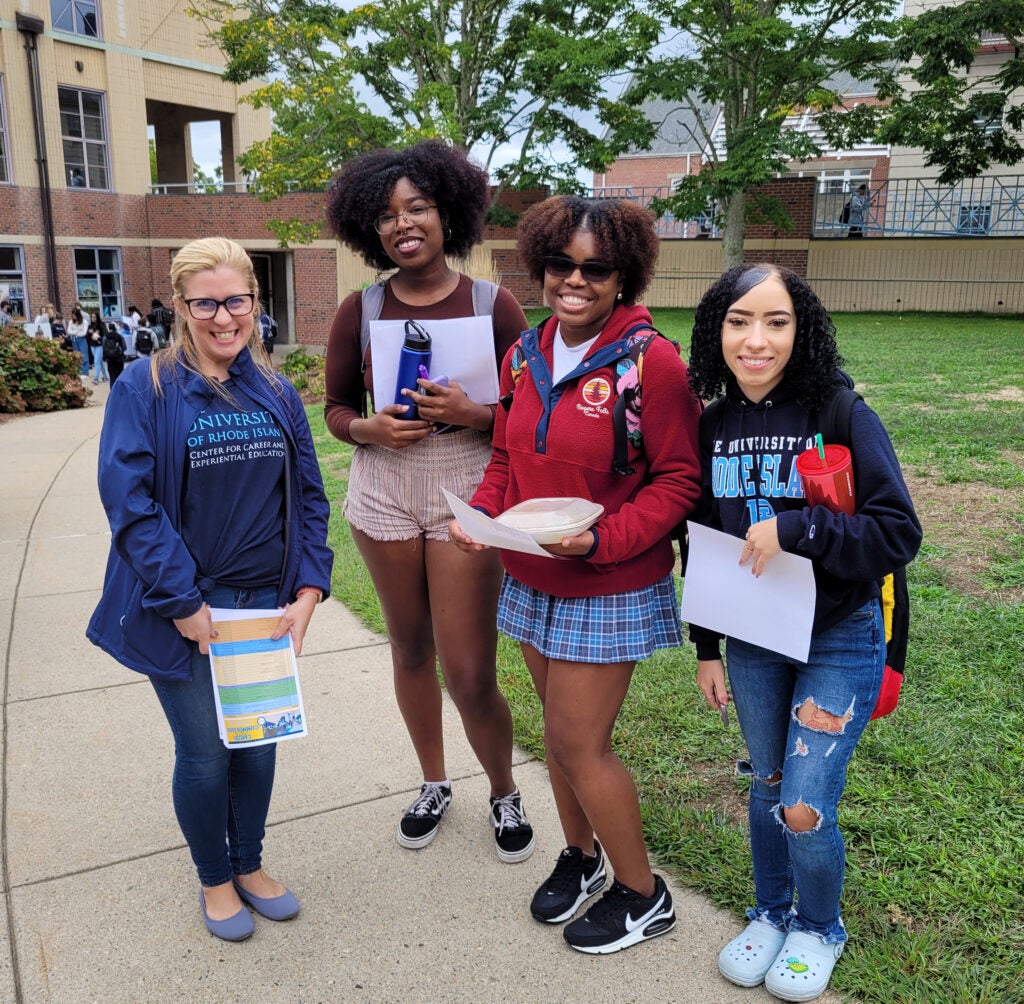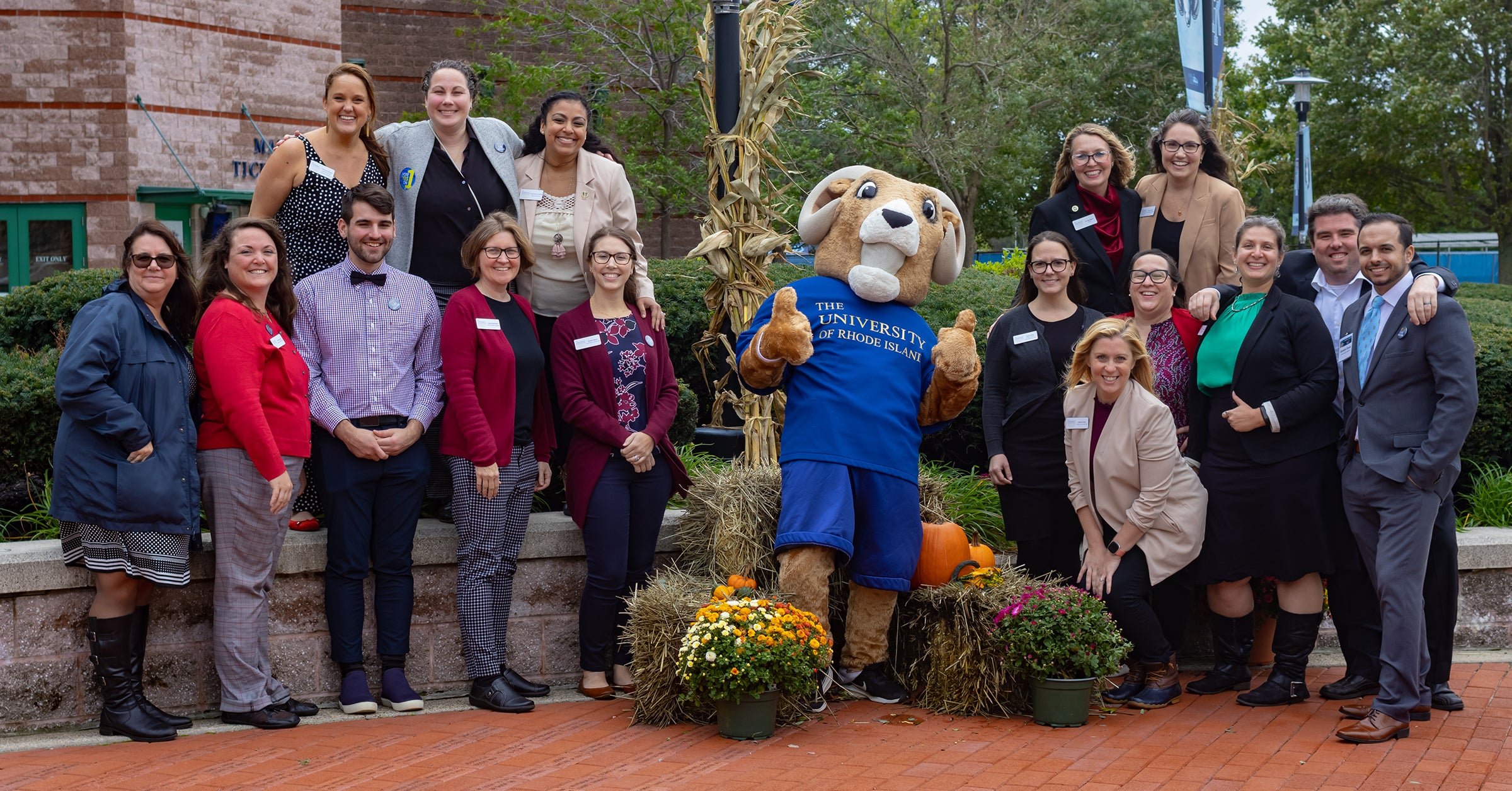KINGSTON, R.I. – July 27, 2023 – Stop by any college career development office. The focus is typically outward and onward: number of internships enlisted, students hired, company connections, organizations visiting campus.
At the University of Rhode Island, the team in URI’s Center for Career and Experiential Education (CCEE) used a different lens to examine success in a new way; they began by looking inward together. Their work may not be the typical career office undertaking but it’s one that is relevant to the modern workplaces their graduates are looking to join, where perception is as important as placements.

On Tuesday afternoons, the office began closing their schedules to appointments to spend time talking about identity and its impact on the work of their office. They still do.
Staff members partnered to tackle challenging topics beyond jobs and LinkedIn profiles, challenging one another to find better ways to support students and work with employers and community partners.
“This journey was uncomfortable and messy at times, but now more than ever is so necessary to best serve our students and employer partners,” said Center Director Kim Stack. “We believe our story is creative, can be replicated, and is worth sharing because of our measurable successes.”

One measure of their success is the department’s recent honorable mention from the National Association of Colleges and Employers (NACE) in the category of Diversity, Equity and Inclusion Excellence. A national award from a professional organization like NACE shows their work is heading in the right direction.
URI’s Center for Career and Experiential Education encounters similar issues as many Northeast institutions of higher education, Stack said. “We are a predominantly white staff working at a predominantly white institution, yet hoping to increase the number of students with varying identities we serve.”
Center staff say that viewing their work through a lens of inclusion has changed the way they teach, advise and work with colleagues and students. What started as a staff professional development exercise pre-pandemic morphed into much more. Staff members learned ways to prioritize social justice, equity, diversity, and inclusion in their work; examined bias; and planned a comprehensive strategic plan.
Kristy Embrack Searles, marketing & event coordinator in the department, said the team’s work has helped to build authentic connections. Searles applauds Stack’s thoughtful team leadership in both unpacking identity and planning those important action steps.
“The direct work with student organizations has really led us to develop trust with students and meet them where they are,” she said. “Kim supported us in making that happen, to connect with groups like PINK, Cape Verdean and Muslim student associations, and other multicultural student organizations.” Searles was reminded of her own journey in college, as a first-generation woman of color, about how that kind of personal impact goes a long way with students. She’s glad to be a part of the department’s concerted effort to truly support all students.
“The centering race work has really been a beautiful thing,” she said. “When students both know and trust us, they are more likely to access our services and feel comfortable walking in.”
Searles credits Stack for leading the all-team effort, not just as a one-time discussion, but on an ongoing and comprehensive basis. “Kim is a dynamic leader and intentional about her approach,” she said. “This is not just a one-time check box or photo opp, but work that’s happening because it’s the right thing, building connections with students and student groups on campus. These are authentic relationships, based on real outreach.”
In addition to exploring and unpacking race and ethnicity, the team is also committed to professional development around gender and sexuality, neurological and physical diversity, mental health and wellness, and other identity spaces reflected in URI’s student population.
Staff members adapted center materials to be more inclusive of all identities, created web content for specific identity groups, and partnered with Bobby Britto-Oliveira at the Multicultural Student Services Center to create the “B.U.I.L.D.” program (Building Unity & Inspired Leaders of the Diaspora) to further support BIPOC students in their journey to career.
Staff members also partnered with the Multicultural Student Services Center to identify student organizations interested in career development. Stack reports that the center has supported hundreds of students of color in the last year with their professional development needs — and they are looking forward to growing this initiative.
Searles likes that the work is concrete, ongoing and creates a legacy. “I say ‘don’t just talk about it, be about it’ — and this work allows for that,” she said. “Kim is a supportive and knowledgeable leader who motivates her staff by highlighting their strengths and, as a result, our team trusts her vision for this work.”
To learn more about how URI’s Center for Career and Experiential Education centered identity in their work, or learn more about opportunities for students of color and partners in the year ahead, contact Stack at kstack@uri.edu.

